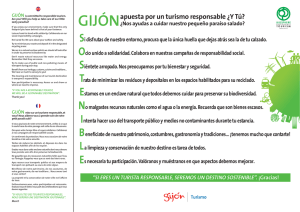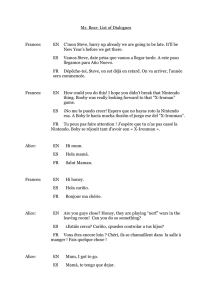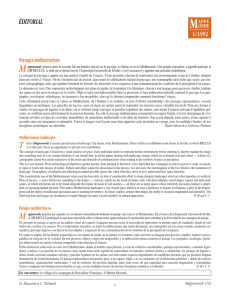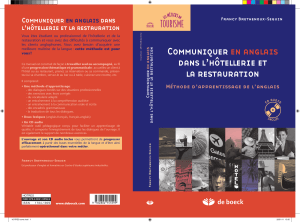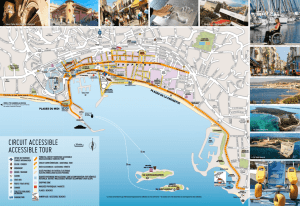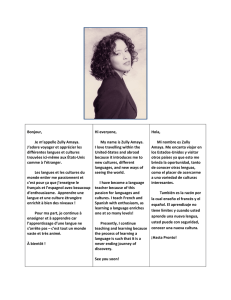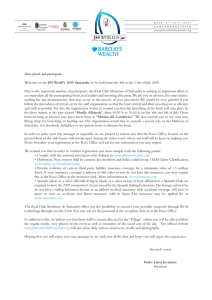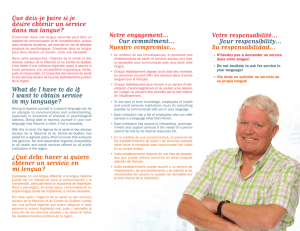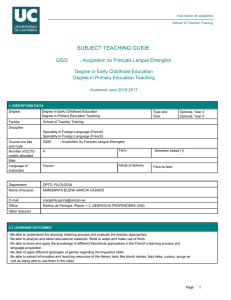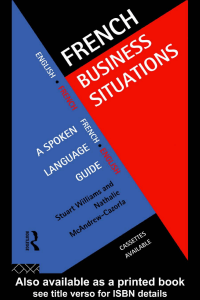Jacques Derrida The Last Interview
Anuncio
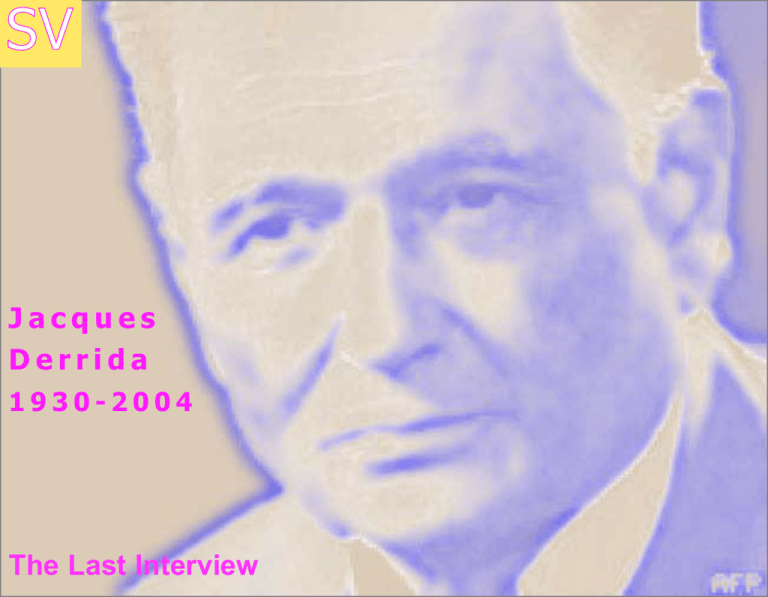
SV Jacques Derrida 1930-2004 The Last Interview Jacques Derrida The Last Interview This special issue of SV is dedicated to the French philosoper Jacques Derrida, who died October 8, 2004 at age 74. This issue presents a translation of Derrida’s last interview given to Le Monde some two months before his death. (It first appeared in Le Monde August 19, 2004.) Listening to Derrida live, and reading Derrida's spoken words, I became especially aware of the philosopher’s esthetic, literary/poetic, and performative qualities. Derrida was the intellectual descendant of Freud, Valery, Lacan and the Surrealists as much as the progeny of Kant, Marx, and Heidegger. The poetic-psychoanalytic-sexual-anarchicoSurrealist strain in his intellectual and linguistic inheritance strongly marks his most famous idea, deconstruction, which I understand as resting on the proposition that a text is possessed of an unconscious, and that it will reveal itself, in all its anxieties and neuroses and pathologies and denials and phantasms, if you analyze it - read it - carefully enough. For Derrida language could - had to - be an open territory where traces of all manner of suppressed things could be released. These psychoanalyticSurrealist qualities were pronounced in Derrida's ideas and writing style, of course, but they were perhaps most vividly felt when he spoke, when he gave free reign to a chain of punning, rhyming, meandering and digressing, repetition, elision and cancellation, free association, verbal legerdemain and somersaulting - when he displayed qualities of playfulness, poeticism, subversiveness, spontaneity, and theatricality. (Geoffrey Hartmann called deconstruction “Derridadaism.”) The following interview presents a Derrida in which these aspects are relatively subdued; but one nonetheless senses a speaker intensely engaged with the possibilities and limits of language. Derrida deeply influenced the way people perceived language and consciousness. From the visual arts to literature and literary studies, philosophy, theology, ethics (political, personal, global), politics and political theory, journalism and criticism, film and TV, architecture and design, and inevitably popular culture and idiom, Derrida's ideas - intellectual enemies and reaction notwithstanding - have become a key element of our cultural atmosphere. His passing invites reflection on what survives him. It can also make one wonder how the philosopher faced that most philosophical of issues, dying (he was known to have been ill with pancreatic cancer); and what his thoughts might have been as the ultimate "period of deferral" was "shrinking ever faster." We get a clear idea of Derrida's thinking at the end in an interview he granted to Le Monde correspondent Jean Birnbaum, conducted less than two months before his death. In this wide-ranging conversation Derrida is occupied with matters of life and death, American geopolitical dominance, the definition and role of Europe, intellectual rigor and political resistance, globalization, injustice, marriage, and a dozen other unresolved matters; but perhaps above all, Derrida focuses on the question of "survival," both in the sense of physical survival and legacy. This translation (with the original French version following) is offered in memoriam, and as a service to interested non-French readers. It is published by agreement with Le Monde. Robert Knafo Jacques Derrida : "I am at war with myself." At 74 years old, Jacques Derrida, world-renowned philosopher, pursues his intellectual journey with a singular intensity even as he confronts serious illness. At his home in Ris-Orangis, a suburb of Paris, he talks to Le Monde about his work, his plans, and his legacy. Since the summer for 2003 you've been everywhere. You've not only published a number of new books, but you've gone around the world attending the numerous international conferences dedicated to exploring your work, from London to Coimbra, back to Paris, and most recently in Rio de Janeiro. You have been the subject of two films, most recently Derrida, by Amy Kofman and Kirby Dick, and Safaa Fathy's very lovely D'ailleurs Derrida in 2000, as well as the focus of many special editions, notably of the Magazine littéraire and the review Europe, as well as an issue of Cahiers de l'Herne which is particularly rich in unpublished material and which is due to appear this fall [2004]. That is a lot in a single year, especially given that - you make no secret of it - you are…. …go ahead and say it, fairly seriously ill. It's true, and undergoing treatment that poses its own challenges. But let's set that aside, if you don't mind, we're not here to issue a health bulletin, public or private. Very well. Then let's go back instead to Specters of Marx [Spectres de Marx] (Galilée, 1993). Key work, landmark work, entirely devoted to a justice to come, and which opens with this mysterious exhortation: "Someone, you or me, comes forward and says: 'I'd finally like to know how to live.'" More than ten years later, where are you with your wish to "know how to live"? It is above all about the question of a "new internationale," the subtitle and theme of the book. Beyond "cosmopolitanism," beyond the "global citizen" as a new global nation-state, this book anticipates all the antiglobalization imperatives that I believe in and that are coming more clearly into view now. What I was calling then a "new internationale," I was saying in 1993, would have given us a great number of changes in the field of human rights and in the organizations that effectively manage the world (IMF, WTO, G8, etc., and especially the UN, where many things should be changed: its mandate, its composition, and above all, its location - to as far away from New York as possible…) As for the turn of phrase finally knowing how to live, it came to me once the book was done. First of all it plays, albeit seriously, with the common meaning of the phrase: to learn to live is to mature, and educate too. To tell someone "I'll teach you how to live" means - sometimes with an undertone of menace - "I'm going to shape you, I'm going to put you right." Also the equivocation of this play means even more to me; this sigh is also an opening to another line of questioning: to live: can that be learned? Taught? Can one learn, by method or training, by experience or experiment, to accept - better yet, to affirm - life? This worry over heritage and death resonates throughout the whole book. It is also the torment of parents and their children: When will you become responsible? When will you be accountable for your own life and name? So to answer your question, without further delay: no, I never learned-to-live. Absolutely not! Learning to live ought to mean learning to die - to acknowledge, to accept, an absolute mortality - without positive outcome, or resurrection, or redemption, for oneself or for anyone else. That has been the old philosophical injunction since Plato: to be a philosopher is to learn how to die. I believe in this truth without giving myself over to it. Less and less in fact. I have not learned to accept death. We are all survivors on deferral (and regarding deferral, from the geopolitical viewpoint in Specters of Marx, the emphasis is especially - in a world that is more inegalitarian than ever - on the billions of living beings - human and otherwise - who are denied not only basic "human rights," which go back two hundred years old and are continually being amplified, but are denied even the right to a live a decent life. But I remain impervious to learning when it comes to knowing-how-to-die, I have yet to learn anything about this particular subject. The period of deferral is shrinking ever faster. More and more, because most of the thinkers that I am associated with are dead, I have been labeled a "last survivor;" because I am, along with some others, the inheritor of so many things, good and awful alike: the final representative of a "generation," the Sixties generation in a word. All of which is not, if you want to be rigorous about it, true, and yet I don't find myself objecting to it entirely; it rather provokes a certain melancholy nostalgia for rebelliousness. What's more, since certain health problems are becoming more pressing, the question of survival or deferral - which has always haunted me, literally, every moment of my life, tangibly, unrelentingly - takes on yet another color. I have always been interested in the subject of survival, the meaning of which is not supplemental to life or death. It is originary: life is survival. Survival in the conventional sense of the term means to continue to live, but also to live after death. Speaking of translation, Walter Benjamin took pains to distinguish between überleben on the one hand, to live after death, as a book can survive the death of its author, or a child the death of parents, and on the other hand, fortleben, living on, to keep on living. All the ideas that have helped me in my work, notably those regarding the trace or the spectral, were related to the idea of "survival" as a basic dimension. It does not derive from either to live or to die. No more than what I call "originary mourning." It is something that does not wait for so-called "actual" death. You have used the term "generation." A problematic concept, which you often take up in your writing. How do you define what is being transmitted by a certain generation in your name? This word I use a little loosely. One can be an "anachronistic" contemporary of a past generation, or the one to come. To be faithful to those considered of my generation, to be the guardian of a common if diverse heritage, means two things: To adhere, in the face of everything, to certain shared disciplines, from Lacan to Althusser, and including Levinas, Foucault, Barthes, Deleuze, Blanchot, Lyotard, Sarah Kofman, etc.; and that is without naming so many thinkers, poets, philosophers, or psychoanalysts who are happily alive, and from whom I have also inherited, and undoubtedly from others abroad, in even greater number, and who, for all their distance, sometimes feel closer. I thereby designate, metonymically, an ethics of writing and thinking that is intransigent, I would even say incorruptible (Helene Cixous calls us the "incorruptibles"), without compromise even with regard to philosophy, which does not retreat despite the prospect that public opinion, the media, or the fantasies of an intimidating readership might effectively demand that we simplify, or shrink back. Thus the austere taste for subtlety, paradox, aporia. This predilection is also a fundamental. It brings into focus not only those whom I evoked - a little arbitrarily, and thus unjustly - but also the greater milieu that sustained them. It had to do with a kind of bygone era (at least for the moment), and not simply of this or that person. That has to be saved or reborn, at all costs. And the responsibility today is critical: it calls for a rigorous war against the doxa, against those that we can call from hereon in the "media intellectuals," against this general discourse pre-formatted by the media, who are themselves under the control of politico-economic lobbies, and often editorial and academic as well. Without being any less European and global, of course. Resistance does not mean that you avoid the media. When possible, you have a responsibility to help them develop and diversify, to call them back to that very same responsibility. At the same time, it is important not to forget that during this "happy" bygone era it was not all peace and calm. Differences and disagreements raged in this milieu, which was anything but homogeneous; and as if you could contain them, for example, in a lame expression like "Spirit of '68," which has become routine in the media and academia, be it as slogan or disparaging term. And even if this faithfulness sometimes still takes the form of unfaithfulness and waywardness, one must be faithful to differences; that is to say, one must go on with the conversation. I continue to have a conversation - with Bourdieu, Lacan, Deleuze, Foucault, for example, who continue to interest me, more than those that the media focuses on these days (with some exceptions, of course). I keep this dialogue alive because it does not become superficial, nor does it degrade into denigration. What I have said about my generation applies also of course to the past, from the Bible to Plato, Kant, Marx, Freud, Heidegger, etc. I do not want to repudiate anything; I cannot. You know, to learn how to live - this is always narcissistic. You want to live as long as you can, to save yourself, to persevere, and to cultivate all these things that, infinitely larger and more powerful than you, are nonetheless part of this "I," from which they overflow on all sides. To ask me to renounce what has shaped me, what I have loved so much, is to ask me to die. In this sort of faithfulness there is a kind of instinct for self-preservation. For me it would be an intolerable obscenity to reject a difficult formulation, a fold, a paradox, yet another contradiction, because it is not going to be understood, or because such and such journalist who does not understand it, who can not get even the title of the book, and thinks that the reader or viewer will not understand either, and that therefore management won't like it or his career will suffer as a result. You might as well ask me to bow and scrape, or to die of stupidity. You invented a form, a writing of survival, that conform to this faithful impatience. Writing of the inherited promise, of the safeguarded trace, of the entrusted responsibility. If I had invented a writing it would have been as an endless revolution. Each situation demands the creation of a suitable mode of exposition, the invention of a law of the singular event, take into account the recipient, imagined or desired; and at the same time it demands the belief that this writing will determine the reader, who will learn to read (or to "live") this writing, which he is not used to finding elsewhere. One hopes that he will be reformed, otherwise determined; for example, these grafts (short of confusion) of the poetic on the philosophical, or certain ways of using homonyms, the undecidable, ruses of language - into which many people see confusion, while ignoring the properly logical need for it. Each book is a teaching method intended to educate its reader. The kind of mass writing that currently dominates in the news media and publishing does not educate its readers; it supposes in some phantasmatic way some already programmed reader, so that it inevitably ends in affirming the existence of some mediocre recipient that it has postulated in advance. So that, by an act of faithfulness, as you say, at the moment of leaving a trace, I cannot but make it available for whoever comes along; I cannot even address it singularly, to anyone person. Each time, as faithful as we may want to be, we are betraying the singularity of the other whom we address. A fortiori when one writes a very general book, one does not know whom one is talking to, one invents and creates silhouettes; but at bottom this no longer belong to us. Oral or written, all these gestures leave us, they begin to act independently of us. Like machines, or better yet like marionettes - I explain myself better about this in Paper Machine (Galilee, 2001). At the moment "my" book is published (no one is forcing me to do so) I become an appearance-disappearance, like that unteachable specter that will never learn how to live. The trace I leave to me means at once my death, to come or already come, and the hope that it will survive me. It is not an ambition of immortality; it is fundamental. I leave here a bit of paper, I leave, I die; it is impossible to exit this structure; it is the unchanging form of my life. Every time I let something go, I live my death in writing. An extreme process; we exert ourselves without knowing whom exactly the thing we leave behind is confided to. Who is going to inherit, and how? It is a question that one can pose oneself today more than ever. It constantly preoccupies me. Our techno-cultural era has deeply changed in this regard. People of my "generation," and at fortiori those of previous generations, had been familiar with a certain historical rhythm; we thought that such and such a work would survive, owing to its qualities, for one, two - or in the case of Plato, 25 - centuries. But today the acceleration of modalities of storage but also the wear and the wearing out changes the structure and the temporal parameters of our legacy. As regards thinking especially the question of survival has become subject to too many unknowns. At my age, I am ready to accept the most contradictory ideas about this issue. I have, I assure you, a dual feeling that, on the one hand, and I say this with a smile, and rather immodesty, that we have not even begun yet to read me; that even if there are of course some very good readers (a few dozen in the world, maybe), at bottom, it is only later that all this has a chance of emerging; but at the same time, I imagine that fifteen days after my death there will be nothing left, except what is kept in storage by legal mandate. I swear to you, I think that both these things are possible at the same time. At the heart of these hopes there is language, and above all the French language. When I read you I feel the deep passion you have for the language. In The Monolinguism of the Other [Le Monolinguisme de l'autre] (Galilée, 1996), you went so far as to offer yourself, ironically, as the last defender and illustrator of the French language… Which does not belong to me, much as it is the only one "I have" to use (to the extent I use it well!) The experience of language is of course vital; and therefore mortal at the same time, nothing new about that. Circumstances dictated that I be an Algerian Jew born before the "War of Independence;" already many distinct attributes even among Jews, and even among Algerian Jews. I took part in the extraordinary transformation of the Algerian Jews; my great-grandparents were by language, custom, etc., still identified with Arabic culture. After the Cremieux Decree (1870), at the end of the 19th c., the following generation became bourgeois. Even if she got married almost clandestinely in some back courtyard of an Algiers municipal office, all because of the fear of pogroms (this was in the time of the Dreyfus Affair), my grandmother was already bringing up her daughters like good middle-class Parisians, (with the good 16th arrondissement manners, the piano lessons…) Then it was the generation of my parents: few intellectuals, mostly merchants, modest and otherwise, some of which were already exploiting a colonial situation in making themselves the exclusive representatives of certain cosmopolitan brands. In a ten-meter square office you could be the representative for all of North Africa for "Marseilles Soap." I am simplifying things a bit… Then it was my generation (a majority of them intellectuals: liberal professions, teaching, medicine, law, etc.). And almost everyone of these in France by 1962. For me, it was earlier (1949). It is with me - I only exaggerate a bit - that mixed marriages began, in a manner that is quasi-tragic, revolutionary, rare and risky. And even as I love life, and my life, love what has made me, the constituent of which is language, this French language that is the only language that I was taught to cultivate, the only language as well that I can call myself more or less accountable for. That is why there is in my writing a - I would not say perverse, but a somewhat violent manner of working with the language. Out of love. Love in general passes through love of language, which is neither nationalist nor conservative, but which demands proof. And labors. You don't do anything you want with language, it was here before us and it will be here after we are gone. If we have an impact on language in some way, this has to be done carefully, respecting even in disrespect its secret laws. This is unfaithful faithfulness: when I cause the French language violence, I do it with the careful respect of what I believe to be an injunction of the language, into its life, its evolution. I cannot read without smiling, sometimes with contempt, the writing of those who believe to be violating, without love, the classic orthography or syntax of the French language, like virgins ejaculating prematurely, while the great French language, ever impervious, watches them do their business and awaits the next one. I describe this ridiculous scenario, rather cruelly, in The Postcard [La Carte postale] (Flammarion, 1980). To leave traces in the history of the French language, this is what is interesting to me. This is my passion, if not in the name of France, for something that the French language has embodied for centuries. I suppose that if love this tongue as I love life itself, and sometimes more than I love such and such a French person of French origin, it is because I love it like a stranger who was received and who appropriated this language as the only one possible for him. Passion and excess. All the French in Algeria share this with me, whether they were Jews or not. Those that came from the urban centers were strangers: oppressors and rule-setters, normalizers and moralizers. It was a model, a norm, a habitus, to which you had to conform. When a professor arrived in the city with his French accent, we thought he was ridiculous! The excess comes from this: I have only one language, and at the same time this language does not belong to me. A singular and exacerbated history, this universal law; a language is now owned. Not naturally, by some essence. This is the source of fantasies of property, of colonialist appropriation and imposition. You have trouble saying "we," usually - "we the philosophers," or "we the Jews," for example. But in view of the new and growing global turmoil you seem to be less and less hesitant to say "we the Europeans." Already in The Other Cape [L'Autre Cap] (Galilée, 1991), a book written at the time of the first Gulf War, you presented yourself as an "old European," as a kind of "European mongrel." Two things: I do indeed have a hard time saying "we," but it does happen. Despite all the issues that torment me in this regard, starting with Israel's disastrous and even suicidal policies, and a certain kind of Zionism - because for me Israel no more represents Judaism than it does the diaspora nor even the global or originary Zionism, which was diverse and often in conflict with itself; there also are in fact fundamentalist Christians in the US who call themselves Zionists. The power of their lobby - and not to speak of the Saudi influence - counts for more than the American Jewish community in influencing the dynamic of US-Israeli politics. Despite all that, and so many other issues that I have with my Jewishness, I would never repudiate it. I would always say, in certain situations, "we the Jews." This tortured "we" lies at the heart of what is troubling to me, the idea of what I have called with a faint smile "the last of the Jews." This thought is akin to what Aristotle profoundly said about prayer (eukhè): it is neither true nor false. It is, literally, a prayer. In certain circumstances, therefore, I will not hesitate to say "we the Jews," or "we the French." What's more, since the beginning of my work, and this would be deconstruction itself, I have remained very critical with regard to Eurocentrism, to its formulation in modernist form, in the work of Valery, Husserl, or Heidegger, for instance. Deconstruction in general is a project that many have taken, rightly so, as an act of defiance toward all Eurocentrism. When I do say, these days, "we the Europeans," it is conjunctive and very different. Notwithstanding everything about the European tradition that can be deconstructed, it nonetheless remains that, precisely because of everything that has happened in Europe - because of the Enlightenment, because of the retrenchment of this little continent, and of the enormous legacy of culpability that it bears (totalitarianism, nazism, genocides, Shoah, colonization and decolonization, etc.), today in the current geopolitical conditions in which we find ourselves, Europe, an entirely other Europe but with the same set of memories, could - or so I would wish - unite against the politics of American global dominance (see Wolfowitz, Cheney, Rumsfeld, etc.) and at the same time also against Arab-Muslim theocratism, unenlightened, and without a political future (but let's also take note of the diversity even in these two blocs, and let us ally ourselves with the opposition within them.) Europe finds itself under the obligation to undertake a new responsibility. I am not talking about the European community as it currently exists, or as it the currently neo-liberal majority imagines it, and literally menaced by so many internal conflicts, but of a Europe to come, and that is still in the process of seeking itself. In the geographic Europe and elsewhere. What is algebraically called "Europe" has to assumer certain responsibilities, in the name of the future of humanity, in the name of international law - this is my faith and my religion. And there I do not hesitate to say "we the Europeans;" it is not a question of wishing for the creation of a Europe as military superpower, protecting its markets and acting as a counterweight against other geopolitical blocs; but rather of a Europe that would sow the grain of a new post-globalization politics. That to me is the one and only possible issue. This movement is coming. Even if the outlines are still forming, I think that nothing will stop it. When I say Europe, this is it: a post-globalization Europe, transforming the concept and the conventions of sovereignty and international law. And availed of a real military force, independent of NATO or the UN, a military power, neither offensive nor defensive, which would firmly enforce the resolutions of a reconstituted UN (for example, and with utmost urgency, in Israel, but also elsewhere). It is also the site from which we can reflect best on certain aspects of secularity, for example, or social justice, which are European legacies as well. (I have just spoken of "secularity." Allow me an extended digression, which has to do not with wearing the veil in school but the veil of "marriage." I gave Noel Mamere's brave and welcome initiative my support with my signature, even if gay marriage stands as an example of this noble tradition inaugurated in the previous century that Americans call "civil disobedience:" not defiance of the law, but disobedience of a legislative stance in favor of a better law - a law yet to come or already inscribed in the spirit or the letter of the constitution. Well, I added my signature in this current legislative context because it struck me as unjust - with respect to gay rights - hypocritical and equivocal in both spirit and letter. If I were a legislator, I would simply propose the abolition of both the word and the concept of "marriage" in the civil and secular code. "Marriage," religious, sacral, heterosexual value, with its procreative intent, for eternal fidelity, etc., is the State's concession to the Christian church, particularly in its monogamous dimension which is neither Jewish (this was imposed on Jews by Europeans only in the last century and among North African Jews was not an obligation as recently as a few generations ago) nor Muslim, as is well known. In doing away with the concept and the word "marriage," this religious equivocation or hypocrisy, which has no place in a secular constitution, would be replaced by a contractual "civil union," a kind of generalized, improved, flexible pact between partners without limitation to gender or number. As for those who want to be untied in marriage in the traditional sense - for which by the way I have the utmost respect they could do it before the religious authority of their choosing - and that is in fact how it is done in other countries that consecrate marriage between homosexuals. Some people could enter into relationships in either one of these ways, some in both ways, and others could do so without regard to either civil law or religious tradition. So much for the digression on marriage. What I call "deconstruction," even when it is directed against something European, is European, is a product of Europe, a reflection of Europe on itself as experience of a radical otherness. Since the days of the Enlightenment, Europe has been in a permanent state of self-critique, and in this tradition of perfectibility there is a hope for the future. At least I hope so, and this is what fuels my indignation before utterances that condemn Europe utterly, as if it were defined only by its crimes. With regard to Europe, are you not at war against yourself? On the one hand, you have noted that the events of 9/11 have done away with the old geopolitical vocabulary of sovereign powers, indicating a state of crisis for a certain idea of the political, that you define as properly European. On the other hand, you maintain an attachment to this European spirit, and above all to the "cosmopolitical" ideal of international law, the decline of which you were in fact talking about. Or is it its survival One has to "raise" (Aufheben) the cosmopolitical (see Cosmopolitans from all countries, yet another task! Galilee, 1997). When one says "political," one uses a Greek word, a European concept that has always presupposed the State, the concept of polis that is linked to the concept of national territory and autochthony. Notwithstanding the interruptions in the flow of this history, this remains the dominant concept of the political, even as numerous forces attempt to dislodge it: the concept of state sovereignty is no longer tied to the land, and neither are communication technology or military doctrine, and so this dislocation throws old European ideas of the political into crisis. As well as ideas of war, and the distinction between civilian and military, and of national and international territory. But I don't think that we need to set ourselves against the concept of the political. That goes also for the concept of sovereignty, which I think retains its validity in certain circumstances, for example in resisting certain forces of a global market. Here again it is a matter of a European heritage being both safeguarded and reformed. That is also what I argue in Hooligans [Voyous] (Galilee, 2003), about democracy as European idea, which in fact has never existed in perfect form, and which is yet to come. And in fact you will always find me making such efforts, for which I have no ultimate justification, except that it is me, it is where I am. It is true, I am at war with myself, and you have no idea to what extent, more than you can guess, and I say things that contradict each other, that are, let's say, in real tension with each other, that compose me, that make me live, and that will make me die. This war, I see it sometimes as a terrifying and painful war, but at the same time I know that it is life. I will not find peace except in eternal rest. Therefore I cannot say that I assume this contradiction, but I know too that it is what allows me to live, and to pose the question, effectively, that you posed, "how to learn how to live?" In two recent books, The End of the World, Always Unique, and Rams [Chaque fois unique, la fin du monde et Béliers] (Galilee, 2003), you come back to this major question of salvation, of the impossible mourning, of survival in fact. If philosophy can be defined as "the anxious anticipation of death" (see Giving Death, Galilee, 1999), can one imagine "deconstruction" as an interminable ethos of survival? As I already said, from the outset and long before the experience of survival that are actually my own, I noted that survival is an original concept, which defines the structure itself of what we call existence, the Da-sein, if you will. We are, structurally speaking, survivors, marked by this structure of the trace, of the testament. That said, I would not endorse the view according to which survival is defined more by death, the past, than by life and the future. No: deconstruction is always on the side of the affirmative, the affirmation of life. Everything I have said at least since Steps (in Vicinities) [Parages], Galilee, 1986) about survival as a complication of the opposition death-life proceeds with me from an unconditional affirmation of life. Survival is life beyond life, life more than life, and the discourse I undertake is not death-oriented, just the opposite, it is the affirmation of someone living who prefers living, and therefore survival, to death; because survival is not simply what remains, it is the most intense life possible. I am never more haunted by the necessity of dying than in moments of happiness and joy. To feel joy and to lament the specter of death, for me is the same thing. When I go over my life, I tend to think that I had the chance to love even the unhappy moments of my life, and to cherish them. Almost all, with almost no exception. When I think of the happy moments, I cherish them too, of course, at the same time that they guide me toward thoughts of death, toward death, because it's over, finished... ~~~ Jacques Derrida : "Je suis en guerre contre moimême" A 74 ans, Jacques Derrida, philosophe de renommée mondiale, poursuit son chemin de pensée avec une singulière intensité, tout en affrontant la maladie. Dans sa maison de Ris-Orangis, en région parisienne, il évoque pour "Le Monde" son œuvre, son itinéraire et sa trace. Depuis l'été 2003, votre présence n'a jamais été plus manifeste. Vous avez non seulement signé plusieurs nouveaux ouvrages, mais aussi couru le monde pour participer aux nombreux colloques internationaux organisés autour de votre travail - de Londres à Coimbra en passant par Paris, et, ces jours-ci, Rio de Janeiro. On vous aura également consacré un deuxième film (Derrida, par Amy Kofman et Kirby Dick, après le très beau D'ailleurs Derrida, de Safaa Fathy en 2000) ainsi que plusieurs numéros spéciaux, notamment du Magazine littéraire et de la revue Europe, ainsi qu'un volume des Cahiers de l'Herne particulièrement riche en inédits, dont la parution est attendue à l'automne. Cela fait beaucoup en une seule année, et pourtant, vous ne vous en cachez pas, vous êtes... ... Dites-le donc, assez dangereusement malade, c'est vrai, et à l'épreuve d'un traitement redoutable. Mais laissons cela, si vous voulez bien, nous ne sommes pas ici pour un bulletin de santé - public ou secret... Soit. Au seuil de cet entretien, faisons donc plutôt retour sur Spectres de Marx (Galilée, 1993). Ouvrage crucial, livre-étape, tout entier consacré à la question d'une justice à venir, et qui s'ouvre par cet exorde énigmatique : "Quelqu'un, vous ou moi, s'avance et dit : je voudrais apprendre à vivre enfin." Plus de dix ans après, où en êtes-vous aujourd'hui, quant à ce désir de "savoir vivre"? Il est alors surtout question d'une "nouvelle internationale", sous-titre et motif central du livre. Au-delà du "cosmopolitisme", au-delà du "citoyen du monde" comme d'un nouvel Etat-nation mondial, ce livre anticipe toutes les urgences "altermondialistes" auxquelles je crois et qui apparaissent mieux maintenant. Ce que j'appelais alors une "nouvelle internationale" nous imposerait, disais-je en l993, un grand nombre de mutations dans le droit international et dans les organisations qui règlent l'ordre du monde (FMI, OMC, G8, etc., et surtout l'ONU, dont il faudrait au moins changer la Charte, la composition et d'abord le lieu de résidence - le plus loin possible de New York...). Quant à la formule que vous citiez ("apprendre à vivre enfin"), elle me vint une fois le livre terminé. Elle joue d'abord, mais sérieusement, avec son sens commun. Apprendre à vivre, c'est mûrir, éduquer aussi. Apostropher quelqu'un pour lui dire "je vais t'apprendre à vivre", cela signifie, parfois sur le ton de la menace, je vais te former, voire te dresser. Puis, et l'équivoque de ce jeu m'importe davantage, ce soupir s'ouvre aussi à une interrogation plus difficile : vivre, cela peut-il s'apprendre ? s'enseigner ? Peut-on apprendre, par discipline ou par apprentissage, par expérience ou expérimentation, à accepter, mieux, à affirmer la vie ? A travers tout le livre résonne cette inquiétude de l'héritage et de la mort. Elle tourmente aussi les parents et leurs enfants : quand deviendras-tu responsable ? Comment répondras-tu enfin de ta vie et de ton nom ? Alors, bon, pour répondre, moi, sans plus de détours à votre question, non, je n'ai jamais appris-à-vivre. Mais alors, pas du tout ! Apprendre à vivre, cela devrait signifier apprendre à mourir, à prendre en compte, pour l'accepter, la mortalité absolue (sans salut, ni résurrection ni rédemption) - ni pour soi ni pour l'autre. Depuis Platon, c'est la vieille injonction philosophique : philosopher, c'est apprendre à mourir. Je crois à cette vérité sans m'y rendre. De moins en moins. Je n'ai pas appris à l'accepter, la mort. Nous sommes tous des survivants en sursis (et du point de vue géopolitique de Spectres de Marx, l'insistance va surtout, dans un monde plus inégalitaire que jamais, vers les milliards de vivants - humains ou non - à qui sont refusés, outre les élémentaires "droits de l'homme", qui datent de deux siècles et qui s'enrichissent sans cesse, mais d'abord le droit à une vie digne d'être vécue). Mais je reste inéducable quant à la sagesse du savoir-mourir. Je n'ai encore rien appris ou acquis à ce sujet. Le temps du sursis se rétrécit de façon accélérée. Non seulement parce que je suis, avec d'autres, héritier de tant de choses, bonnes ou terribles : de plus en plus souvent, la plupart des penseurs auxquels je me trouvais associé étant morts, on me traite de survivant : l'ultime représentant d'une "génération", celle, en gros, des années 1960 ; ce qui, sans être rigoureusement vrai, ne m'inspire pas seulement des objections mais des sentiments de révolte un peu mélancoliques. Comme, de surcroît, certains problèmes de santé se font pressants, la question de la survie ou du sursis, qui m'a toujours hanté, littéralement, à chaque instant de ma vie, de façon concrète et inlassable, se colore autrement aujourd'hui. Je me suis toujours intéressé à cette thématique de la survie, dont le sens ne s'ajoute pas au vivre et au mourir. Elle est originaire : la vie est survie. Survivre au sens courant veut dire continuer à vivre, mais aussi vivre après la mort. A propos de la traduction, Walter Benjamin souligne la distinction entre überleben d'une part, survivre à la mort, comme un livre peut survivre à la mort de l'auteur, ou un enfant à la mort des parents, et, d'autre part, fortleben, living on, continuer à vivre. Tous les concepts qui m'ont aidé à travailler, notamment celui de la trace ou du spectral, étaient liés au "survivre" comme dimension structurale. Elle ne dérive ni du vivre ni du mourir. Pas plus que ce que j'appelle le "deuil originaire". Celui-ci n'attend pas la mort dite "effective". Vous avez utilisé le mot "génération". Notion d'usage délicat, qui revient souvent sous votre plume : comment désigner ce qui, en votre nom, se transmet d'une génération ? Ce mot, je m'en sers ici de façon un peu lâche. On peut être le contemporain "anachronique" d'une "génération" passée ou à venir. Etre fidèle à ceux qu'on associe à ma "génération", se faire le gardien d'un héritage différencié mais commun, cela veut dire deux choses : d'abord, tenir, éventuellement contre tout et contre tous, à des exigences partagées, de Lacan à Althusser, en passant par Levinas, Foucault, Barthes, Deleuze, Blanchot, Lyotard, Sarah Kofman, etc. ; sans nommer tant de penseurs écrivains, poètes, philosophes ou psychanalystes heureusement vivants, dont j'hérite aussi, d'autres sans doute à l'étranger, plus nombreux et parfois plus proches encore. Je désigne ainsi, par métonymie, un ethos d'écriture et de pensée intransigeant, voire incorruptible (Hélène Cixous nous surnomme les "incorruptibles"), sans concession même à l'égard de la philosophie, et qui ne se laisse pas effrayer par ce que l'opinion publique, les médias, ou le fantasme d'un lectorat intimidant, pourraient nous obliger à simplifier ou à refouler. D'où le goût sévère pour le raffinement, le paradoxe, l'aporie. Cette prédilection reste aussi une exigence. Elle allie non seulement ceux et celles que j'ai évoqués un peu arbitrairement, c'est-à-dire injustement, mais tout le milieu qui les soutenait. Il s'agissait d'une sorte d'époque provisoirement révolue, et non simplement de telle ou telle personne. Il faut sauver ou faire renaître cela, donc, à tout prix. Et la responsabilité aujourd'hui est urgente : elle appelle une guerre inflexible à la doxa, à ceux qu'on appelle désormais les "intellectuels médiatiques", à ce discours général formaté par les pouvoirs médiatiques, eux-mêmes entre les mains de lobbies politico-économiques, souvent éditoriaux et académiques aussi. Toujours européens et mondiaux, bien sûr. Résistance ne signifie pas qu'on doive éviter les médias. Il faut, quand c'est possible, les développer et les aider à se diversifier, les rappeler à cette même responsabilité. En même temps, ne pas oublier que, à cette époque "heureuse" de naguère, rien n'était irénique, certes. Les différences et les différends faisaient rage dans ce milieu qui était tout sauf homogène comme ce qu'on pourrait regrouper, par exemple, dans une appellation débile du genre "pensée 68" dont le mot d'ordre ou le chef d'accusation domine souvent aujourd'hui et la presse et l'université. Or même si cette fidélité prend quelquefois encore la forme de l'infidélité et de l'écart, il faut être fidèle à ces différences, c'est-à-dire continuer la discussion. Moi, je continue à discuter - Bourdieu, Lacan, Deleuze, Foucault, par exemple, qui continuent de m'intéresser largement plus que ceux autour desquels se presse la presse aujourd'hui (sauf exception, bien sûr). Je garde ce débat vivant, pour qu'il ne s'aplatisse pas, ni ne se dégrade en dénigrements. Ce que j'ai dit de ma génération vaut bien sûr pour le passé, de la Bible à Platon, Kant, Marx, Freud, Heidegger, etc. Je ne veux pas renoncer à quoi que ce soit, je ne le peux pas. Vous savez, apprendre à vivre, c'est toujours narcissique : on veut vivre autant que possible, se sauver, persévérer, et cultiver toutes ces choses qui, infiniment plus grandes et puissantes que soi, font néanmoins partie de ce petit "moi" qu'elles débordent de tous les côtés. Me demander de renoncer à ce qui m'a formé, à ce que j'ai tant aimé, c'est me demander de mourir. Dans cette fidélité-là, il y a une sorte d'instinct de conservation. Renoncer, par exemple, à une difficulté de formulation, à un pli, à un paradoxe, à une contradiction supplémentaire, parce que ça ne va pas être compris, ou plutôt parce que tel journaliste qui ne sait pas la lire, pas lire le titre même d'un livre, croit comprendre que le lecteur ou l'auditeur ne comprendra pas davantage et que l'Audimat ou son gagne-pain en souffriront, c'est pour moi une obscénité inacceptable. C'est comme si on me demandait de m'incliner, de m'asservir - ou de mourir de bêtise. Vous avez inventé une forme, une écriture de la survivance, qui convient à cette impatience de la fidélité. Ecriture de la promesse héritée, de la trace sauvegardée et de la responsabilité confiée. Si j'avais inventé mon écriture, je l'aurais fait comme une révolution interminable. Dans chaque situation, il faut créer un mode d'exposition approprié, inventer la loi de l'événement singulier, tenir compte du destinataire supposé ou désiré ; et en même temps prétendre que cette écriture déterminera le lecteur, lequel apprendra à lire (à "vivre") cela, qu'il n'était pas habitué à recevoir d'ailleurs. On espère qu'il en renaîtra, autrement déterminé : par exemple, ces greffes sans confusion du poétique sur le philosophique, ou certaines manières d'user des homonymies, de l'indécidable, des ruses de la langue - que beaucoup lisent dans la confusion pour en ignorer la nécessité proprement logique. Chaque livre est une pédagogie destinée à former son lecteur. Les productions de masse qui inondent la presse et l'édition ne forment pas les lecteurs, elles supposent de façon fantasmatique un lecteur déjà programmé. Si bien qu'elles finissent par formater ce destinataire médiocre qu'elles ont d'avance postulé. Or, par souci de fidélité, comme vous dites, au moment de laisser une trace, je ne peux que la rendre disponible pour quiconque : je ne peux même pas l'adresser singulièrement à quelqu'un. Chaque fois, si fidèle qu'on veuille être, on est en train de trahir la singularité de l'autre à qui l'on s'adresse. A fortiori quand on écrit des livres d'une grande généralité : on ne sait pas à qui on parle, on invente et crée des silhouettes, mais au fond cela ne nous appartient plus. Oraux ou écrits, tous ces gestes nous quittent, ils se mettent à agir indépendamment de nous. Comme des machines, au mieux comme des mar- ionnettes - je m'en explique mieux dans Papier Machine (Galilée, 2001). Au moment où je laisse (publier) "mon" livre (personne ne m'y oblige), je deviens, apparaissant-disparaissant, comme ce spectre inéducable qui n'aura jamais appris à vivre. La trace que je laisse me signifie à la fois ma mort, à venir ou déjà advenue, et l'espérance qu'elle me survive. Ce n'est pas une ambition d'immortalité, c'est structurel. Je laisse là un bout de papier, je pars, je meurs : impossible de sortir de cette structure, elle est la forme constante de ma vie. Chaque fois que je laisse partir quelque chose, je vis ma mort dans l'écriture. Epreuve extrême : on s'exproprie sans savoir à qui proprement la chose qu'on laisse est confiée. Qui va hériter, et comment ? Y aura-t-il même des héritiers ? C'est une question qu'on peut se poser aujourd'hui plus que jamais. Elle m'occupe sans cesse. Le temps de notre techno-culture a radicalement changé à cet égard. Les gens de ma "génération", et a fortiori des plus anciennes, avaient été habitués à un certain rythme historique : on croyait savoir que telle œuvre pouvait ou non survivre, en fonction de ses qualités, pendant un, deux, voire, comme Platon, vingtcinq siècles. Mais aujourd'hui l'accélération des modalités de l'archivation mais aussi l'usure et la destruction transforment la structure et la temporalité de l'héritage. Pour la pensée, la question de la survie prend désormais des formes absolument imprévisibles. A mon âge, je suis prêt aux hypothèses les plus contradictoires à ce sujet : j'ai simultanément, je vous prie de me croire, le double sentiment que, d'un côté, pour le dire en souriant et immodestement, on n'a pas commencé à me lire, que s'il y a, certes, beaucoup de très bons lecteurs (quelques dizaines au monde, peut-être), au fond, c'est plus tard que tout cela a une chance d'apparaître ; mais aussi bien que, d'un autre côté, quinze jours ou un mois après ma mort, il ne restera plus rien. Sauf ce qui est gardé par le dépôt légal en bibliothèque. Je vous le jure, je crois sincèrement et simultanément à ces deux hypothèses. Au cœur de cette espérance, il y a la langue, et d'abord la langue française. Quand on vous lit, on sent à chaque ligne l'intensité de votre passion pour elle. Dans Le Monolinguisme de l'autre (Galilée, 1996), vous allez jusqu'à vous présenter, ironiquement, comme le "dernier défenseur et illustrateur de la langue française"... Qui ne m'appartient pas, bien que ce soit la seule que "j'aie" à ma disposition (et encore !). L'expérience de la langue, bien sûr, est vitale. Mortelle, donc, rien d'original à cela. Les contingences ont fait de moi un juif français d'Algérie de la génération née avant la "guerre d'indépendance" : autant de singularités, même parmi les juifs et même parmi les juifs d'Algérie. J'ai participé à une transformation extraordinaire du judaïsme français d'Algérie : mes arrière-grands-parents étaient encore très proches des Arabes par la langue, les coutumes, etc. Après le décret Crémieux (1870), à la fin du XIXe siècle, la génération suivante s'est embourgeoisée : bien qu'elle se soit mariée presque clandestinement dans l'arrière-cour d'une mairie d'Alger à cause des pogroms (en pleine affaire Dreyfus), ma grand-mère élevait déjà ses filles comme des bourgeoises parisiennes (bonnes manières du 16e arrondissement, leçons de piano...). Puis ce fut la génération de mes parents : peu d'intellectuels, des commerçants surtout, modestes ou non, dont certains exploitaient déjà une situation coloniale en se faisant les représentants exclusifs de grandes marques métropolitaines : avec un petit bureau de 10 mètres carrés et sans secrétaire, on pouvait représenter tout le "savon de Marseille" en Afrique du Nord - je simplifie un peu. Puis ce fut ma génération (une majorité d'intellectuels : professions libérales, enseignement, médecine, droit, etc.). Et presque tout ce monde en France en 1962. Moi, ce fut plus tôt (1949). C'est avec moi, j'exagère à peine, que les mariages "mixtes" ont commencé. De façon quasi tragique, révolutionnaire, rare et risquée. Et de même que j'aime la vie, et ma vie, j'aime ce qui m'a constitué, et dont l'élément même est la langue, cette langue française qui est la seule langue qu'on m'a appris à cultiver, la seule aussi dont je puisse me dire plus ou moins responsable. Voilà pourquoi il y a dans mon écriture une façon, je ne dirais pas perverse, mais un peu violente, de traiter cette langue. Par amour. L'amour en général passe par l'amour de la langue, qui n'est ni nationaliste ni conservateur, mais qui exige des preuves. Et des épreuves. On ne fait pas n'importe quoi avec la langue, elle nous préexiste, elle nous survit. Si l'on affecte la langue de quelque chose, il faut le faire de façon raffinée, en respectant dans l'irrespect sa loi secrète. C'est ça, la fidélité infidèle : quand je violente la langue française, je le fais avec le respect raffiné de ce que je crois être une injonction de cette langue, dans sa vie, son évolution. Je ne lis pas sans sourire, parfois avec mépris, ceux qui croient violer, sans amour, justement, l'orthographe ou la syntaxe "classiques" d'une langue française, avec de petits airs de puceaux à éjaculation précoce, alors que la grande langue française, plus intouchable que jamais, les regarde faire en attendant le prochain. Je décris cette scène ridicule de façon un peu cruelle dans La Carte postale (Flammarion, 1980). Laisser des traces dans l'histoire de la langue française, voilà ce qui m'intéresse. Je vis de cette passion, sinon pour la France, du moins pour quelque chose que la langue française a incorporé depuis des siècles. Je suppose que si j'aime cette langue comme j'aime ma vie, et quelquefois plus que ne l'aime tel ou tel Français d'origine, c'est que je l'aime comme un étranger qui a été accueilli, et qui s'est approprié cette langue comme la seule possible pour lui. Passion et surenchère. Tous les Français d'Algérie partagent cela avec moi, juifs ou non. Ceux qui venaient de la métropole étaient tout de même des étrangers : oppresseurs et normatifs, normalisateurs et moralisateurs. C'était un modèle, un habit ou un habitus, il fallait s'y plier. Quand un prof arrivait de la métropole avec l'accent français, on le trouvait ridicule ! La surenchère vient de là : je n'ai qu'une langue, et en même temps cette langue ne m'appartient pas. Une histoire singulière a exacerbé chez moi cette loi universelle : une langue, ça n'appartient pas. Pas naturellement et par essence. D'où les fantasmes de propriété, d'appropriation et d'imposition colonationaliste. En général, vous avez du mal à dire "nous" - "nous les philosophes", ou "nous les juifs", par exemple. Mais, à mesure que se déploie le nouveau désordre mondial, vous semblez de moins en moins réticent à dire "nous les Européens". Déjà, dans L'Autre Cap (Galilée, 1991), livre écrit au moment de la première guerre du Golfe, vous vous présentiez comme un "vieil Européen", comme "une sorte de métis européen". Deux rappels : j'ai en effet du mal à dire "nous", mais il m'arrive de le dire. Malgré tous les problèmes qui me torturent à ce sujet, à commencer par la politique désastreuse et suicidaire d'Israël - et d'un certain sionisme (car Israël ne représente pas plus à mes yeux le judaïsme qu'il ne représente la diaspora ni même le sionisme mondial ou originaire qui fut multiple et contradictoire ; il y a d'ailleurs aussi des fondamentalistes chrétiens qui se disent sionistes authentiques aux USA. La puissance de leur lobby compte plus que la communauté juive américaine, sans parler de la saoudienne, dans l'orientation conjointe de la politique américano-israélienne) -, eh bien malgré tout cela et tant d'autres problèmes que j'ai avec ma "judéité", je ne la dénierai jamais. Je dirai toujours, dans certaines situations, "nous les juifs". Ce "nous" si tourmenté est au cœur de ce qu'il y a de plus inquiet dans ma pensée, celle de celui que j'ai surnommé en souriant à peine "le dernier des juifs". Elle serait dans ma pensée ce qu'Aristote dit profondément de la prière (eukhè) : elle n'est ni vraie ni fausse. C'est d'ailleurs, littéralement, une prière. Dans certaines situations, donc, je n'hésiterai pas à dire "nous les juifs", et aussi "nous les Français". Ensuite, depuis le début de mon travail, et ce serait la "déconstruction" même, je suis resté extrêmement critique à l'égard de l'eurocentrisme, dans la modernité de ses formulations, chez Valéry, Husserl ou Heidegger par exemple. La déconstruction en général est une entreprise que beaucoup ont considérée, à juste titre, comme un geste de méfiance à l'égard de tout eurocentrisme. Quand il m'arrive, ces temps-ci, de dire "nous les Européens", c'est conjoncturel et très différent : tout ce qui peut être déconstruit de la tradition européenne n'empêche pas que, justement à cause de ce qui s'est passé en Europe, à cause des Lumières, à cause du rétrécissement de ce petit continent et de l'énorme culpabilité qui transit désormais sa culture (totalitarisme, nazisme, génocides, Shoah, colonisation et décolonisation, etc.), aujourd'hui, dans la situation géopolitique qui est la nôtre, l'Europe, une autre Europe mais avec la même mémoire, pourrait (c'est en tout cas mon vœu) se rassembler à la fois contre la politique d'hégémonie américaine (rapport Wolfowitz, Cheney, Rumsfeld, etc.) et contre un théocratisme arabo-islamique sans Lumières et sans avenir politique (mais ne négligeons pas les contradictions et les hétérogénéités de ces deux ensembles, et allions-nous avec ceux qui résistent de l'intérieur à ces deux blocs). L'Europe se trouve sous l'injonction d'assumer une responsabilité nouvelle. Je ne parle pas de la communauté européenne telle qu'elle existe ou se dessine dans sa majorité actuelle (néolibérale) et virtuellement menacée de tant de guerres internes, mais d'une Europe à venir, et qui se cherche. En Europe ("géographique") et ailleurs. Ce qu'on nomme algébriquement "l'Europe" a des responsabilités à prendre, pour l'avenir de l'humanité, pour celui du droit international - ça c'est ma foi, ma croyance. Et là, je n'hésiterai pas à dire "nous les Européens". Il ne s'agit pas de souhaiter la constitution d'une Europe qui serait une autre superpuissance militaire, protégeant son marché et faisant contrepoids aux autres blocs, mais d'une Europe qui viendrait semer la graine d'une nouvelle politique altermondialiste. Laquelle est pour moi la seule issue possible. Cette force est en marche. Même si ses motifs sont encore confus, je pense que plus rien ne l'arrêtera. Quand je dis l'Europe, c'est ça : une Europe altermondialiste, transformant le concept et les pratiques de la souveraineté et du droit international. Et disposant d'une véritable force armée, indépendante de l'OTAN et des USA, une puissance militaire qui, ni offensive, ni défensive, ni préventive, interviendrait sans tarder au service des résolutions enfin respectées d'une nouvelle ONU (par exemple, de toute urgence, en Israël, mais aussi ailleurs). C'est aussi le lieu depuis lequel on peut penser au mieux certaines figures de la laïcité, par exemple, ou de la justice sociale, autant d'héritages européens. (Je viens de dire "laïcité". Permettez-moi ici une longue parenthèse. Elle ne concerne pas le voile à l'école mais le voile du "mariage". J'ai soutenu de ma signature sans hésiter l'initiative bienvenue et courageuse de Noël Mamère, même si le mariage entre homosexuels constitue un exemple de cette belle tradition que les Américains ont inaugurée au siècle dernier sous le nom de "civil disobedience": non pas défi à la Loi, mais désobéissance à une disposition législative au nom d'une loi meilleure - à venir ou déjà inscrite dans l'esprit ou la lettre de la Constitution. Eh bien, j'ai "signé" dans ce contexte législatif actuel parce qu'il me paraît injuste - pour les droits des homosexuels -, hypocrite et équivoque dans son esprit et dans sa lettre. Si j'étais législateur, je proposerais tout simplement la disparition du mot et du concept de "mariage" dans un code civil et laïque. Le "mariage", valeur religieuse, sacrale, hétérosexuelle - avec vœu de procréation, de fidélité éternelle, etc. -, c'est une concession de l'Etat laïque à l'Eglise chrétienne - en particulier dans son monogamisme qui n'est ni juif (il ne fut imposé aux juifs par les Européens qu'au siècle dernier et ne constituait pas une obligation il y a quelques générations au Maghreb juif) ni, cela on le sait bien, musul- man. En supprimant le mot et le concept de "mariage", cette équivoque ou cette hypocrisie religieuse et sacrale, qui n'a aucune place dans une constitution laïque, on les remplacerait par une "union civile" contractuelle, une sorte de pacs généralisé, amélioré, raffiné, souple et ajusté entre des partenaires de sexe ou de nombre non imposé. Quant à ceux qui veulent, au sens strict, se lier par le "mariage" - pour lequel mon respect est d'ailleurs intact -, ils pourraient le faire devant l'autorité religieuse de leur choix - il en est d'ailleurs ainsi dans d'autres pays qui acceptent de consacrer religieusement des mariages entre homosexuels. Certains pourraient s'unir selon un mode ou l'autre, certains sur les deux modes, d'autres ne s'unir ni selon la loi laïque ni selon la loi religieuse. Fin de la parenthèse conjugale. (C'est une utopie mais je prends date.) Ce que j'appelle "déconstruction", même quand c'est dirigé contre quelque chose de l'Europe, c'est européen, c'est un produit, un rapport à soi de l'Europe comme expérience de l'altérité radicale. Depuis l'époque des Lumières, l'Europe s'autocritique en permanence, et dans cet héritage perfectible, il y a une chance d'avenir. Du moins voudrais-je l'espérer, et c'est ce qui nourrit mon indignation devant des discours qui condamnent l'Europe définitivement, comme si elle n'était que le lieu de ses crimes. Quant à l'Europe, n'êtes-vous pas en guerre avec vous-même ? D'un côté, vous marquez que les attentats du 11-Septembre ruinent la vieille grammaire géopolitique des puissances souveraines, signant ainsi la crise d'un certain concept du politique, que vous définissez comme proprement européen. De l'autre, vous maintenez un attachement à cet esprit européen, et d'abord à l'idéal cosmopolitique d'un droit international dont vous décrivez, justement, le déclin. Ou la survie... Il faut "relever" (Aufheben) le cosmopolitique (voir Cosmopolites de tous les pays, encore un effort !, Galilée, 1997). Quand on dit politique, on se sert d'un mot grec, d'un concept européen qui a toujours supposé l'Etat, la forme polis liée au territoire national et à l'autochtonie. Quelles que soient les ruptures à l'intérieur de cette histoire, ce concept du politique reste dominant, au moment même où beaucoup de forces sont en train de le disloquer : la souveraineté de l'Etat n'est plus liée à un territoire, les technologies de communication et la stratégie militaire non plus, et cette dislocation met effectivement en crise le vieux concept européen du politique. Et de la guerre, et de la distinction entre civil et militaire, et du terrorisme national ou international. Mais je ne crois pas qu'il faille s'emporter contre le politique. De même pour la souveraineté, dont je crois qu'elle a du bon dans certaines situations, pour lutter par exemple contre certaines forces mondiales du marché. Là encore, il s'agit d'un héritage européen qu'il faut à la fois garder et transformer. C'est aussi ce que je dis, dans Voyous (Galilée, 2003), de la démocratie comme idée européenne, qui en même temps n'a jamais existé de façon satisfaisante, et reste à venir. Et en effet vous retrouverez toujours ce geste chez moi, pour lequel je n'ai pas de justification ultime, sauf que c'est moi, c'est là où je suis. Je suis en guerre contre moi-même, c'est vrai, vous ne pouvez pas savoir à quel point, au-delà de ce que vous devinez, et je dis des choses contradictoires, qui sont, disons, en tension réelle, me construisent, me font vivre, et me feront mourir. Cette guerre, je la vois parfois comme une guerre terrifiante et pénible, mais en même temps je sais que c'est la vie. Je ne trouverai la paix que dans le repos éternel. Donc je ne peux pas dire que j'assume cette contradiction, mais je sais aussi que c'est ce qui me laisse en vie, et me fait poser la question, justement, que vous rappeliez, "comment apprendre à vivre ?". Dans deux livres récents (Chaque fois unique, la fin du monde et Béliers, Galilée, 2003), vous êtes revenu sur cette grande question du salut, de l'impossible deuil, bref de la survie. Si la philosophie peut être définie comme "l'anticipation soucieuse de la mort" (voir Donner la mort, Galilée, 1999), peut-on envisager la "déconstruction" comme une interminable éthique du survivant? Comme je l'ai déjà rappelé, dès le début, et bien avant les expériences de la survivance qui sont à présent les miennes, j'ai marqué que la survie est un concept original, qui constitue la structure même de ce que nous appelons l'existence, le Da-sein, si vous voulez. Nous sommes structurellement des survivants, marqués par cette structure de la trace, du testament. Mais, ayant dit cela, je ne voudrais pas laisser cours à l'interprétation selon laquelle la survivance est plutôt du côté de la mort, du passé, que de la vie et de l'avenir. Non, tout le temps, la déconstruction est du côté du oui, de l'affirmation de la vie. Tout ce que je dis - depuis Pas au moins (dans Parages, Galilée, 1986) - de la survie comme complication de l'opposition vie-mort procède chez moi d'une affirmation inconditionnelle de la vie. La survivance, c'est la vie au-delà de la vie, la vie plus que la vie, et le discours que je tiens n'est pas mortifère, au contraire, c'est l'affirmation d'un vivant qui préfère le vivre et donc le survivre à la mort, car la survie, ce n'est pas simplement ce qui reste, c'est la vie la plus intense possible. Je ne suis jamais autant hanté par la nécessité de mourir que dans les moments de bonheur et de jouissance. Jouir et pleurer la mort qui guette, pour moi c'est la même chose. Quand je me rappelle ma vie, j'ai tendance à penser que j'ai eu cette chance d'aimer même les moments malheureux de ma vie, et de les bénir. Presque tous, à une exception près. Quand je me rappelle les moments heureux, je les bénis aussi, bien sûr, en même temps ils me précipitent vers la pensée de la mort, vers la mort, parce que c'est passé, fini... S V. D e r r i d a w a s p u b l i s h e d i n N o v e m b e r 2 0 0 4 . S V ( t m ) , St u d i o Vi s i t ( t m ) , a n d k m a p ( t m ) a r e p a n y. t r a d e m a r k s o f k m a p , a N e w Yo r k a r t c o m - All rights reserved. The contents of this publication are copyright © 2003-2004. N o r e p r o d u c t i o n m a y b e m a d e w i t h o u t p e r m i s s i o n . S V i s p r o d u c e d i n N e w Yo r k , N Y, U S A . Information/contact: E: office@studiovisit.net T: 9 1 7 . 3 4 0 . 3 7 6 0
